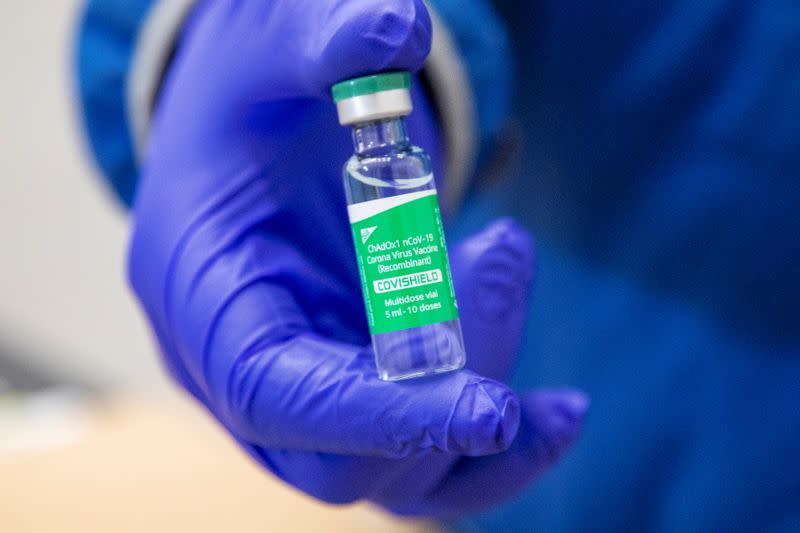
Best Life
If You Take This Medication, You're More Likely to Get a Blood Clot
On April 13, the Centers for Disease Control and Prevention (CDC) and the U.S. Food and Drug Administration (FDA) recommended pausing the use of the Johnson&Johnson COVID vaccine due to six reports of people experiencing rare blood clots following vaccination. The announcement brought a discussion of blood clots to the forefront. Many people began pointing out numerous other factors that increase your risk of experiencing a blood clot—more so than the Johnson&Johnson vaccine—including medication, pregnancy, and getting COVID. Read on to find out which medication makes you more likely to get a blood clot, and for more medication concerns, discover The One Pain Reliever You Should Never Take for Your Back, New Study Says. Certain birth control medications can increase your risk of getting a blood clot. Certain kinds of birth control can increase a person's risk of developing a blood clot by two to four times, according to the Cleveland Clinic. Many birth controls utilize the hormone estrogen, in addition to progestin, to prevent pregnancy by halting a woman's ovulation. While an increase in estrogen helps keep you from getting pregnant, increased estrogen levels promote the formation of blood clots, the Cleveland Clinic explains."When we talk about blood clot risk in relation to birth control, we're only talking about birth control that contains estrogen, which includes combination birth control pills [i.e. pills that contain estrogen and progestin], birth control rings, and the birth control patch," primary care physician Nancy Shannon, PhD, senior medical advisor at Nurx, told Shape. And for more medications to be careful with, If You Take These 2 OTC Meds Together, You're Putting Your Liver at Risk. The rare blood clots from the Johnson&Johnson vaccine and birth control aren't the same. About one to five women out of every 10,000 not on birth control will have a blood clot, compared to three to nine women on hormonal birth control pills, according to FDA research. Meanwhile, out of the 6.8 million people that received the Johnson&Johnson vaccine in the U.S., six of them experienced a blood clot. But while it may be useful to look at these numbers side by side, the blood clots themselves are not the same.The blood clots seen in Johnson&Johnson recipients are cerebral venous sinus thrombosis (CVST), a rare and severe blood clot in the brain, alongside low platelet levels. The type of blood clot that stems from birth control is deep vein thrombosis (DVT), which is clotting in major veins in the legs or lungs. It's rare for hormonal birth control to cause blood clots in the brain, but it can happen, especially among those who experience migraines, per Shape. DVT is usually treated with Heparin, a blood thinner, according to the Mayo Clinic. In the case of CVST, however, Heparin could actually worsen the situation, and make treatment more challenging. And for more medication to avoid, If You Take This Common Medication to Sleep, Stop Now, New Study Says. There are other risk factors that make you more likely to have a blood clot while on birth control. The increased risk of blood clots when on birth control, while minimal, could be more significant for people with other risk factors. The Cleveland Clinic notes that people who are over the age of 40, obese, smoke, have a history of blood clots, or have a genetic factor that increases their risk of blood clots are at an increased risk when taking birth control. Additionally, vascular internist Deborah Hornacek, MD, told the Cleveland Clinic that "from the first several months up to the first year is the highest-risk time period because your hormone levels are actually changing." Short-term risks that could make you more prone to blood clots include long-distance travel and surgery.Shape suggests talking with your doctor if you have any of these risk factors or experience migraines with aura to see if a progestin-only method of birth control may be better for you. And for more useful information delivered straight to your inbox, sign up for our daily newsletter. Make sure you know the signs of a blood clot. According to the Mayo Clinic, common symptoms of a DVT blood clot include swelling in the affected leg (there's rarely swelling in both legs), pain in your leg that often starts in the calf and feels like cramping or soreness, red or discolored skin on the leg, and a feeling of warmth in the leg.If part of the blood clot breaks off and heads to the lungs, it could lead to a pulmonary embolism. Signs of this include sudden shortness of breath, chest pain that worsens when you breathe, dizziness, rapid pulse, rapid breathing, and coughing up blood. If you experience any symptoms of DVT or a pulmonary embolism, seek emergency medical assistance. And for more medication side effects, If You Can't Sleep, This OTC Medication Could Be Why, Experts Say.
Article From & Read More ( Canada has second case of rare blood clots after AstraZeneca vaccine - Yahoo News )https://ift.tt/3svH6Ci
Health
Bagikan Berita Ini















0 Response to "Canada has second case of rare blood clots after AstraZeneca vaccine - Yahoo News"
Post a Comment